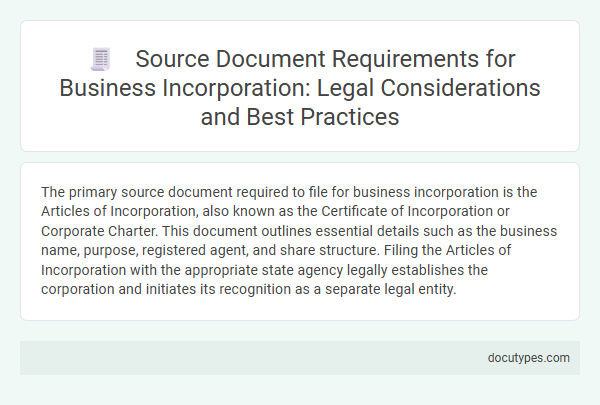The primary source document required to file for business incorporation is the Articles of Incorporation, also known as the Certificate of Incorporation or Corporate Charter. This document outlines essential details such as the business name, purpose, registered agent, and share structure. Filing the Articles of Incorporation with the appropriate state agency legally establishes the corporation and initiates its recognition as a separate legal entity.
Introduction to Source Document Requirements for Business Incorporation
What source document is required to file for business incorporation? Filing for business incorporation necessitates submitting a foundational source document that formalizes the business entity's creation. This document varies by jurisdiction but generally includes articles of incorporation or a certificate of formation.
Legal Importance of Source Documents in Business Formation
Source documents such as Articles of Incorporation or Certificates of Formation are essential for business incorporation, serving as the foundational legal evidence of a company's existence. These documents define the company's structure, purpose, and authorized shares, providing regulatory bodies with critical information for official registration. Proper filing ensures compliance with state laws, protects the business's legal status, and establishes legitimacy for contracts and liability protection.
Key Types of Source Documents Required for Incorporation
Filing for business incorporation requires specific source documents to ensure legal compliance and proper registration. Key types include the Articles of Incorporation, which outline the company's structure, purpose, and shareholders' information. Additional documents such as the Bylaws, Registered Agent Consent, and Initial Report may also be required depending on the jurisdiction.
Jurisdictional Variations in Incorporation Document Requirements
Filing for business incorporation requires submitting specific source documents that vary depending on the jurisdiction. Commonly, these include Articles of Incorporation, Certificates of Formation, or Corporate Charters.
Each state or country mandates distinct forms and information in these documents, reflecting local regulatory frameworks. You must verify the exact incorporation document requirements with the relevant government authority or registry to ensure compliance.
Best Practices for Preparing Incorporation Source Documents
Filing for business incorporation requires specific source documents that comply with state regulations and accurately represent your company's structure. Proper preparation of these documents ensures a smooth incorporation process and legal compliance.
- Articles of Incorporation - This primary document outlines the corporation's name, purpose, registered agent, and share structure.
- Bylaws - Internal rules governing the management and operational procedures of the corporation must be clearly detailed.
- Initial Resolutions - Formal decisions by the incorporators or board members, such as appointing officers and adopting bylaws, should be documented.
Thoroughly reviewing and customizing incorporation documents reduces errors and speeds up state approval.
Common Legal Pitfalls in Source Document Submission
Filing for business incorporation requires precise source documents to ensure legal compliance and streamline registration. Common legal pitfalls in submitting these documents can result in delays or rejections by regulatory bodies.
- Incorrect or incomplete Articles of Incorporation - Missing essential information like the company name, registered agent, or business purpose often causes rejection.
- Improperly executed signatures - Failure to obtain all required signatures or notarizations invalidates the document submission.
- Failure to comply with state-specific formatting requirements - Submitting forms without adhering to prescribed templates or filing fees may delay processing.
Verification and Authentication of Incorporation Documents
Filing for business incorporation requires submission of key source documents such as the Articles of Incorporation, which establish the legal existence of the entity. Verification of these documents is essential to ensure accuracy and compliance with state laws.
Authentication typically involves notarization or certification by a government official to validate the documents' legitimacy. Proper verification and authentication protect against fraud and confirm the business's lawful formation.
Recordkeeping and Compliance Obligations Post-Incorporation
The primary source document required to file for business incorporation is the Articles of Incorporation, which establishes the legal existence of the corporation. Post-incorporation, maintaining accurate recordkeeping and fulfilling compliance obligations is essential to uphold the corporation's legal standing.
- Articles of Incorporation - This document includes the corporation's name, purpose, registered agent, and stock details, and must be filed with the state.
- Corporate Bylaws - These outline the governance structure and operational rules that support internal compliance and recordkeeping.
- Annual Reports and Meeting Minutes - These records ensure ongoing regulatory compliance and provide documented evidence of corporate activities after incorporation.
Digitalization and Secure Storage of Legal Incorporation Documents
Filing for business incorporation requires submitting primary source documents such as Articles of Incorporation or a Certificate of Incorporation. These documents establish the legal existence of the business entity with the state and include essential information like company name, purpose, and ownership structure.
Digitalization of incorporation documents enhances accessibility and ensures faster processing by regulatory authorities. Secure storage solutions, including encrypted cloud services and blockchain technology, protect sensitive legal information from unauthorized access and data loss. Maintaining digital copies also facilitates compliance audits and future amendments to the business's legal status.
What Source Document Is Required to File for Business Incorporation? Infographic

